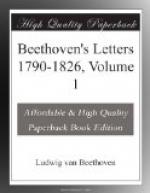[Footnote 1: The celebrated letters to Bettina are given here exactly as published in her book, Ilius Pamphilius und die Ambrosia (Berlin, Arnim, 1857) in two volumes. I never myself had any doubts of their being genuine (with the exception of perhaps some words in the middle of the third letter), nor can any one now distrust them, especially after the publication of Beethoven’s Letters. But for the sake of those for whom the weight of innate conviction is not sufficient proof, I may here mention that in December, 1864, Professor Moritz Carriere, in Munich, when conversing with me about Beethoven’s Letters, expressly assured me that these three letters were genuine, and that he had seen them in Berlin at Bettina v. Arnim’s in 1839, and read them most attentively and with the deepest interest. From their important contents, he urged their immediate publication; and when this shortly after ensued, no change whatever struck him as having been made in the original text; on the contrary, he still perfectly remembered that the much-disputed phraseology (and especially the incident with Goethe) was precisely the same as in the originals. This testimony seems to me the more weighty, as M. Carriere must not in such matters be looked on as a novice, but as a competent judge, who has carefully studied all that concerns our literary heroes, and who would not permit anything to be falsely imputed to Beethoven any more than to Goethe. Beethoven’s biography is, however, the proper place to discuss more closely such things, especially his character and his conduct in this particular case. At present we only refer in general terms to the first chapter of Beethoven’s Jugend, which gives all the facts connected with these letters to Bettina and the following ones—a characteristic likeness of Beethoven thus impressed itself on the mind of the biographer, and was reproduced in a few bold outlines in his Biography. These letters could not, however, possibly be given in extenso in a general introduction to a comprehensive biography.]
67.
TO BETTINA BRENTANO.
Vienna, Feb. 10, 1811.
DEAR AND BELOVED FRIEND,—
I have now received two letters from you, while those to Tonie show that you still remember me, and even too kindly. I carried your letter about with me the whole summer, and it often made me feel very happy; though I do not frequently write to you, and you never see me, still I write you letters by thousands in my thoughts. I can easily imagine what you feel at Berlin in witnessing all the noxious frivolity of the world’s rabble,[1] even had you not written it to me yourself. Such prating about art, and yet no results!!! The best description of this is to be found in Schiller’s poem “Die Fluesse,” where the river Spree is supposed to speak. You are going to be married, my dear friend, or are already so, and I have had no chance of seeing you even once previously. May all the felicity




